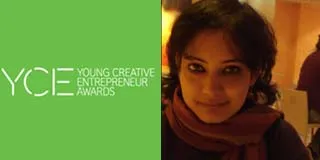Aparna Sanyal, Co-founder, Oasis Television and Mixed Media Productions, on the journey of creative entrepreneurship

The first thing that one notices about Aparna Sanyal is her enthusiasm. When she speaks about an impending project or film, one could easily think of her as someone fresh out of college. But having been in the domain of non-fiction content for over 11 years, she's anything but a newbie. We at YourStory spoke to her about the two companies that she's founded and her experience at the Young Screen Entrepreneur Awards where she was a finalist. To find out more about the British Council Young Screen Entrepreneur Award, click here (http://www.britishcouncil.org/india-arts-iyfey.htm). To follow the Young Creative Entrepreneur Awards on Facebook, click here (http://www.facebook.com/YCEAwards).
Aparna, tell us about Mixed Media Productions and Oasis Television.
My partner, Gaurav Dhingra and I started Mixed Media Productions in 2008 with the idea of doing television content, corporate films, documentaries and development projects. We wanted to experiment and share our expertise through workshops on digital storytelling and other such initiatives. In about two years, we had done all this and more. We had even worked on some research projects. The amount of television work that we were getting was growing rapidly and we wanted to form a 'private limited' company to smoothen things. We had some issues getting the name 'Mixed Media Productions'. And hence, we called it Oasis Television. We've managed to bifurcate the areas of interest, with Oasis being the hub for mainstream work and Mixed Media being the nerve center for experimental projects and developmental work. And the arrangement is working out quite well.
So, how did Mixed Media Productions come into existence?
Well, I had been doing non-fiction content since 1999. Essentially, I had been involved with a number of television shows and documentaries (some for television and a few independent ones). My partner, Gaurav comes with a background in film production. He started out with mainstream Bollywood films and drifted towards non-fiction. Both of us had worked together as a part of the core team of this show called The Amazing Race. After the show got done, we went our separate ways. He did a lot of international projects and I went on to be the programming head of the Delhi bureau of Times Now. I did this for about three years, from 2005 to 2008. In 2008, we managed to have a chance conversation about starting something on our own. We met over coffee, had a detailed chat and we were on. I quit my job right after and we started Mixed Media Productions. And since then, we've done public service ads, films for the UNDP, films for various governmental organizations and even workshops for NGOs. In retrospect, it seems crazy. But I guess that's how things get done.
It must have been hard in the beginning, then.
Actually, we managed to land our first project within a month of our inception. It was a series of films for a government organization. But yes, money-wise, the first year was a tad difficult. We were investing in our business. We went out and bought accounting software, editing software, etc. And these don't come cheap. After the first year, things got much better. The challenge now is to maintain the balance between mainstream work and experimental/developmental projects. We enjoy the latter. But the former has the uncanny ability to completely engulf you. We're trying to walk the middle path here and at some level, attempting to juggle money and passion.
What would you count as your biggest success so far?
Recently, we did the Indian chapter of "IRT" or "Ice Road Truckers", a phenomenally popular History Channel show in the US and UK. It's a 10-part documentary series. The original show is about truck drivers who drive supplies through Alaska at the height of winter. For the Indian equivalent, we did a number of recces and zeroed in on Himachal Pradesh. Our version is titled "IRT - Deadliest Roads". This is the biggest international television series to be shot in India. It was extremely difficult to shoot. But we managed with the co-operation of the Government of Himachal Pradesh and the Jaypee Group.
Take us through your experience with YCE.
I heard about YCE from a friend and applied for it on a lark. I managed to rush in an entry at the last moment. But we were thrilled to know that we were shortlisted. I went down to Mumbai for the interviews and was declared as one of the finalists. The experience was great. British Council even sponsored my trip to London. I was one of the three people sent to interact with a forum of investors looking at Indian media companies. By the end of it, I had a much clearer picture with respect to what investors were looking at and the sort of propositions that were considered worthwhile. That sort of learning was invaluable.
We at YourStory wish Aparna and Gaurav all the very best. Please do let us know your thoughts about this story. You can also email the author at sriram@yourstory.in
Sriram Mohan | YourStory | 11th January 2011 | Bangalore






